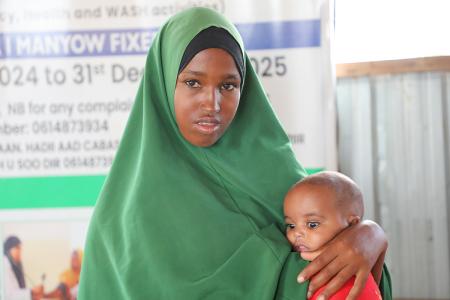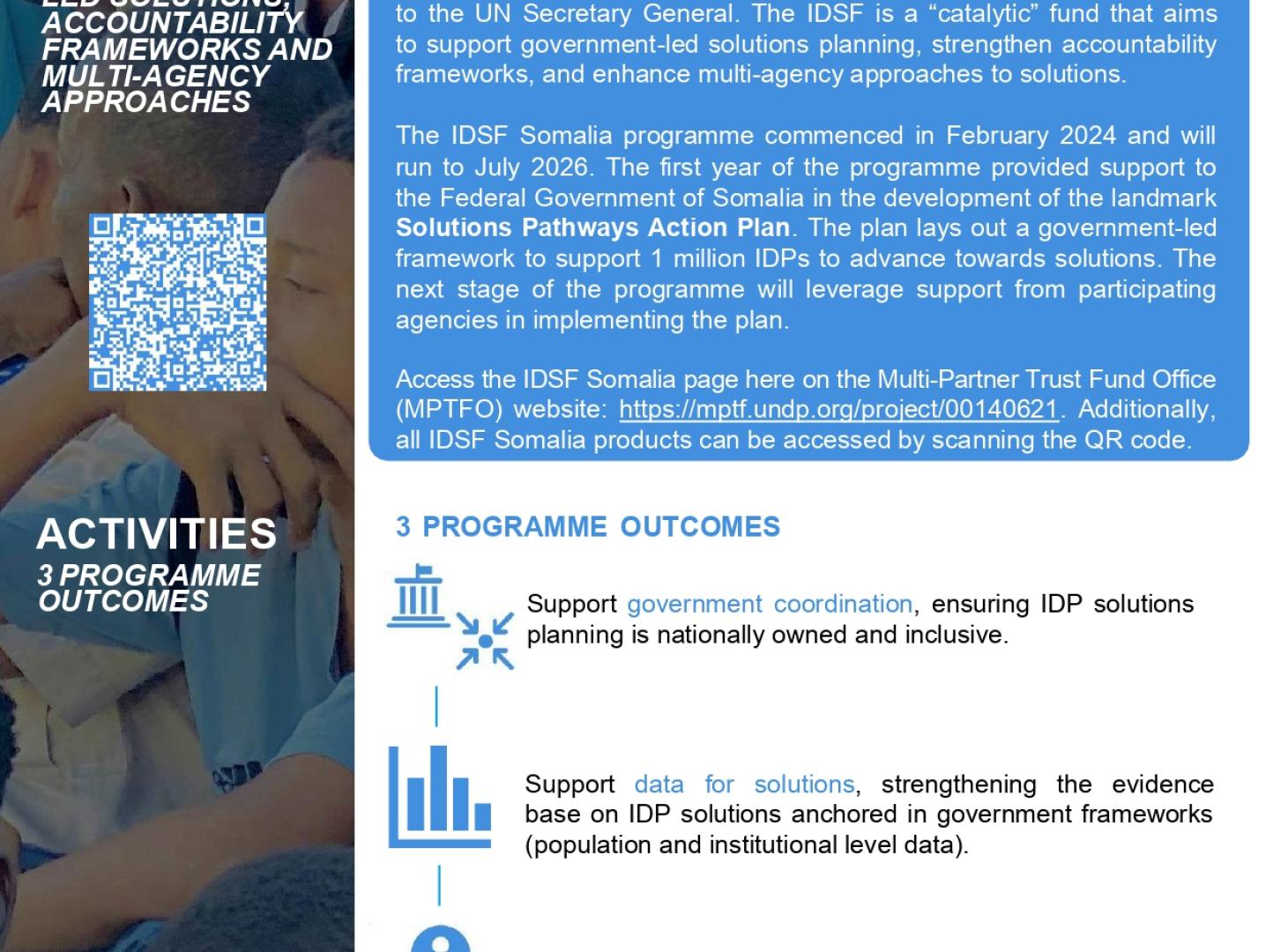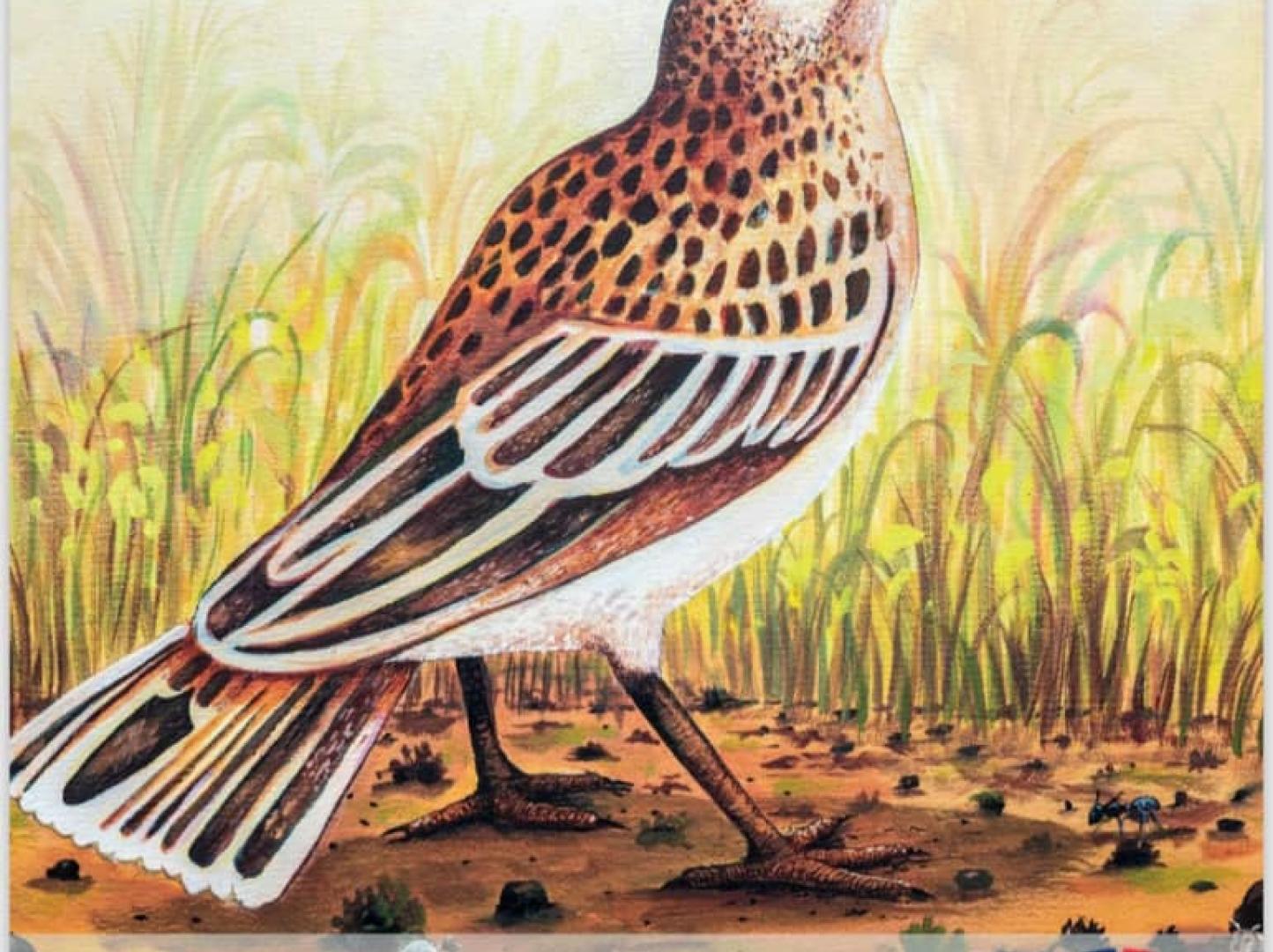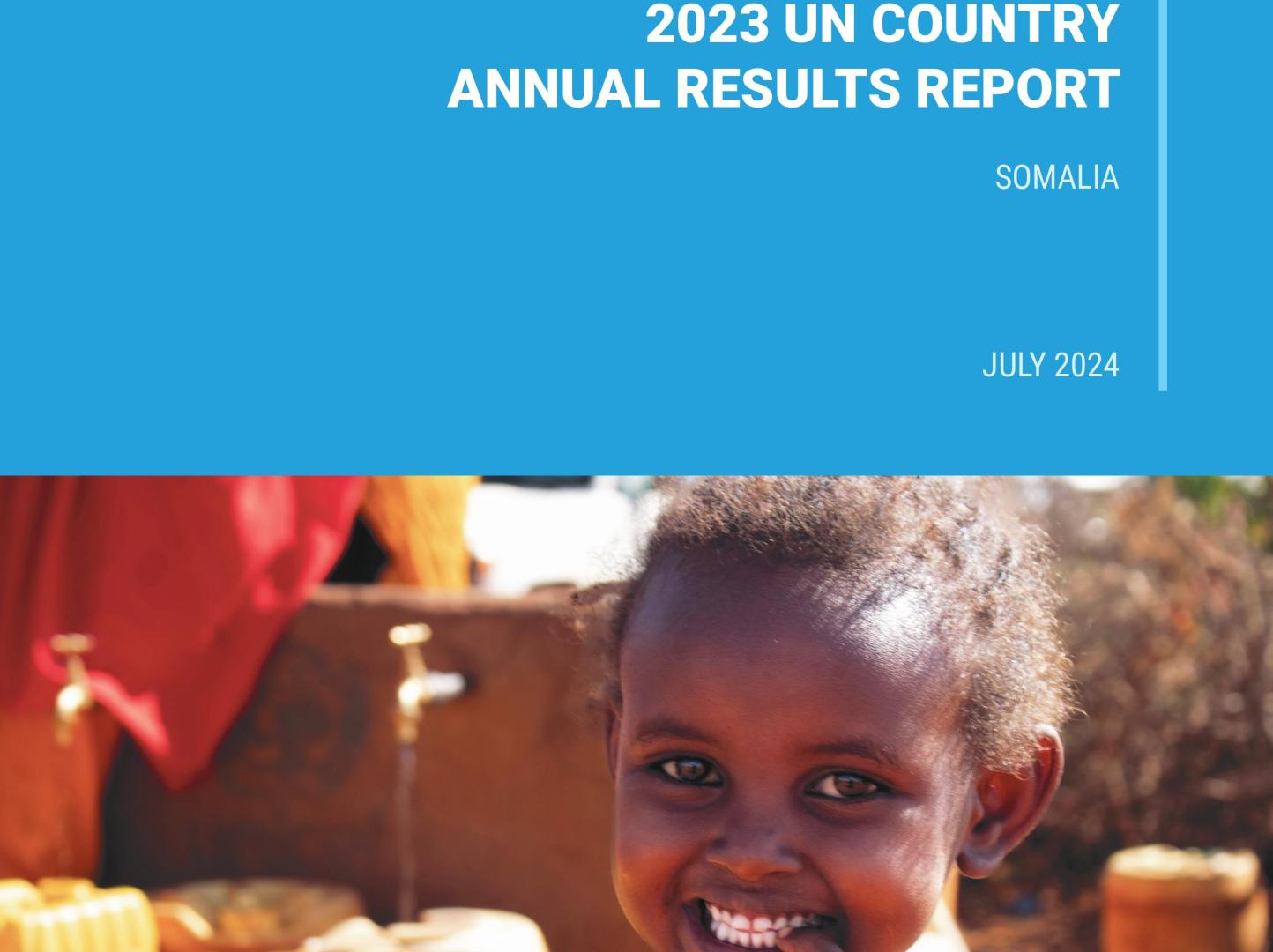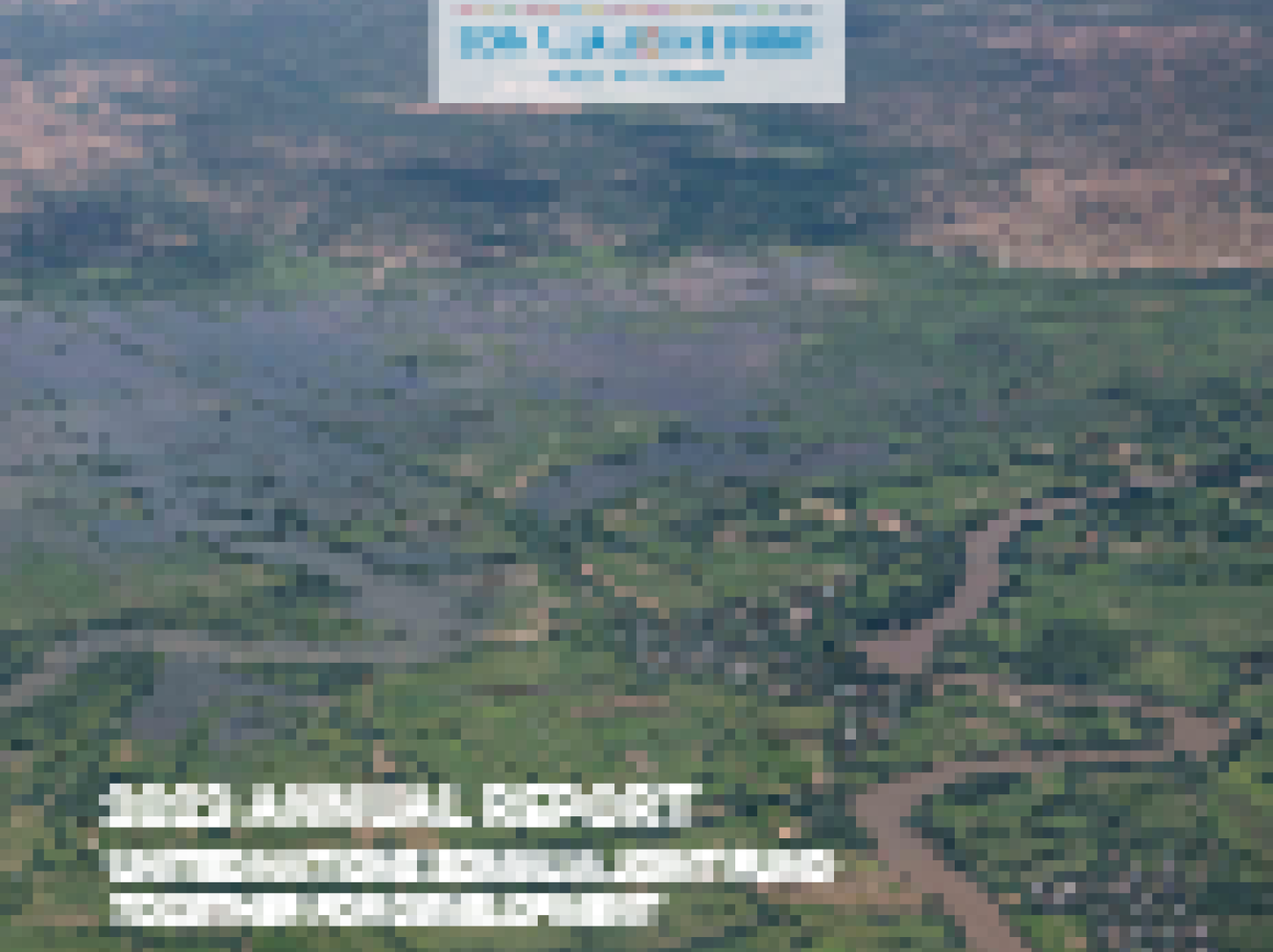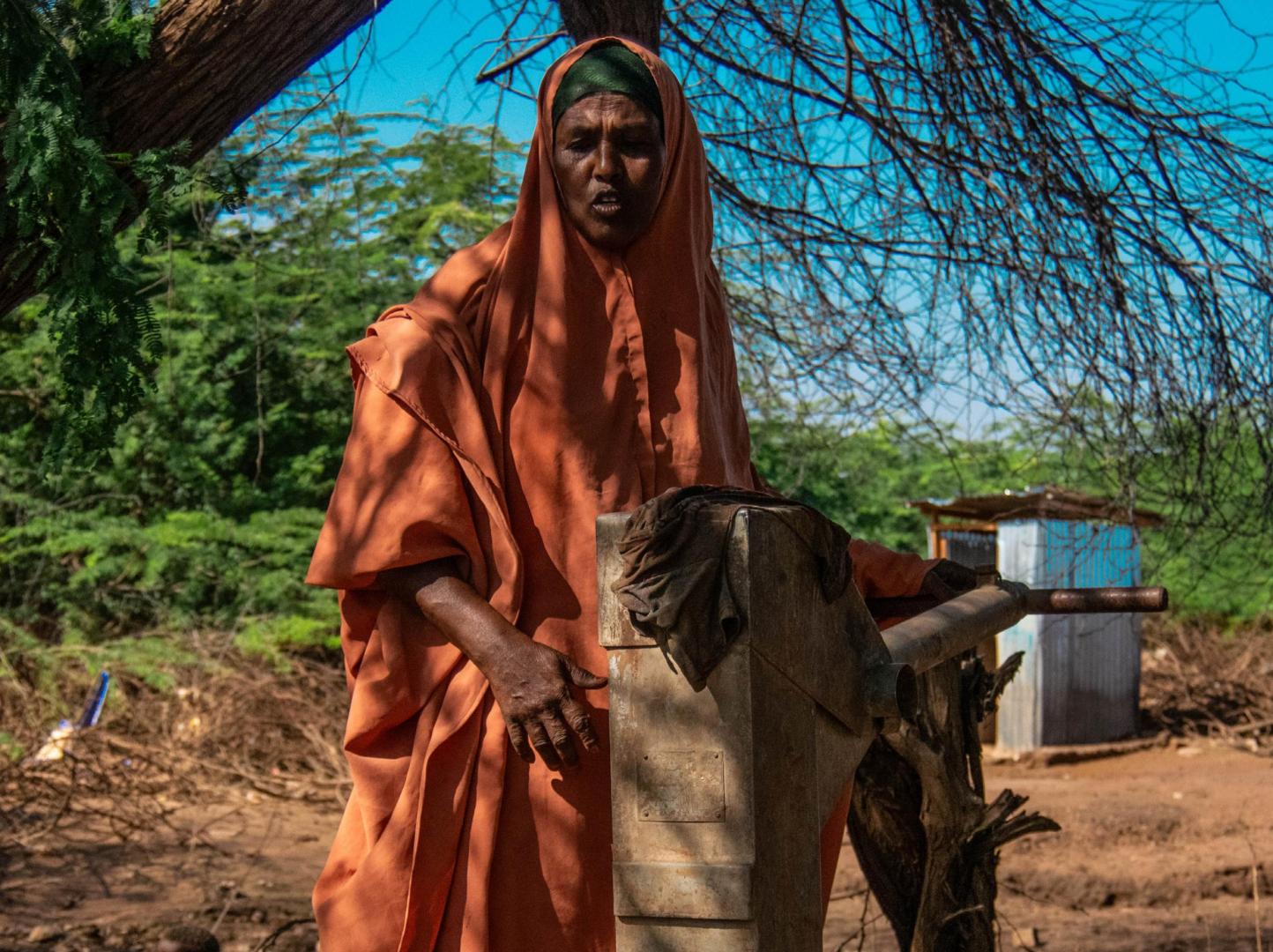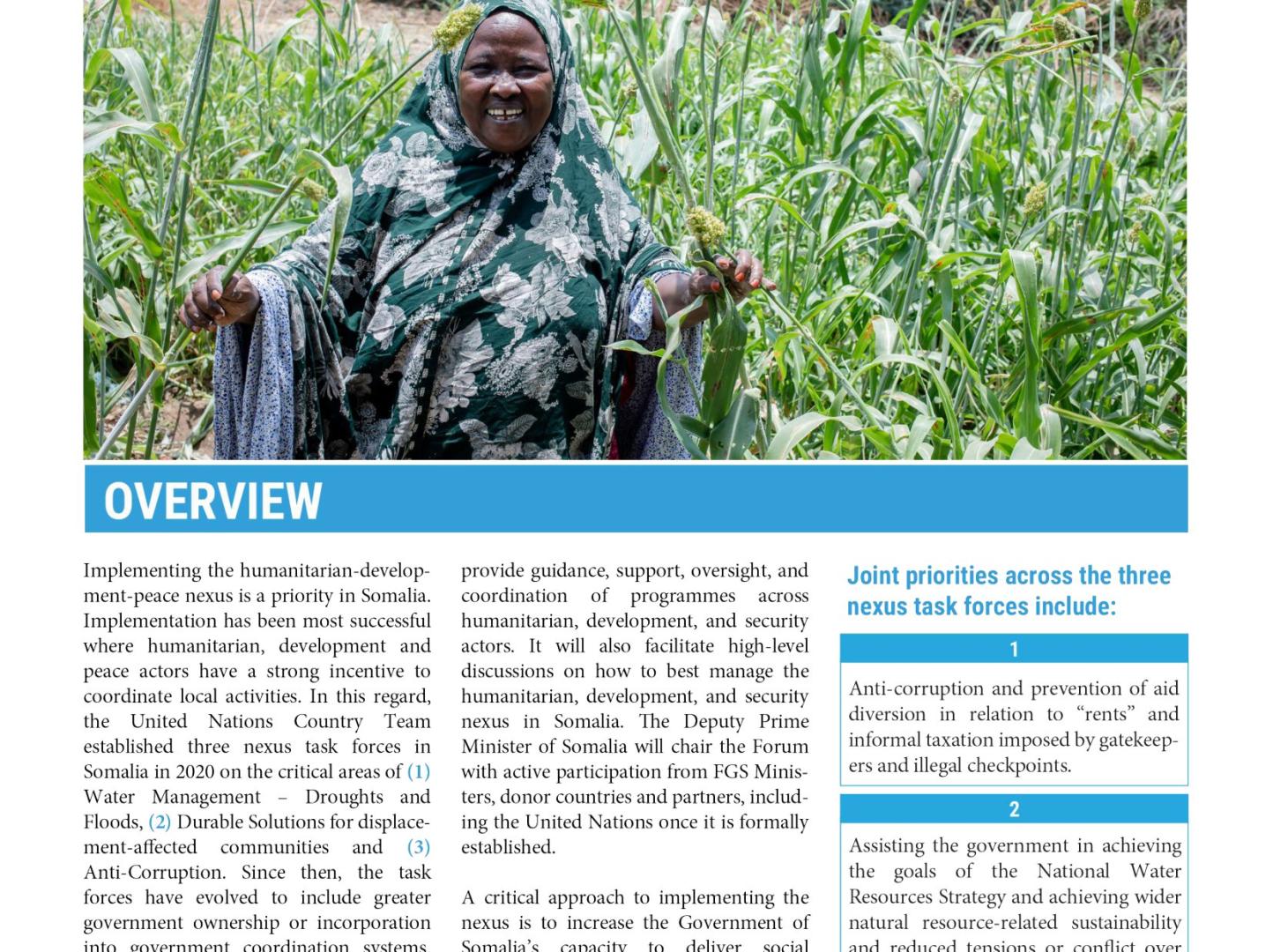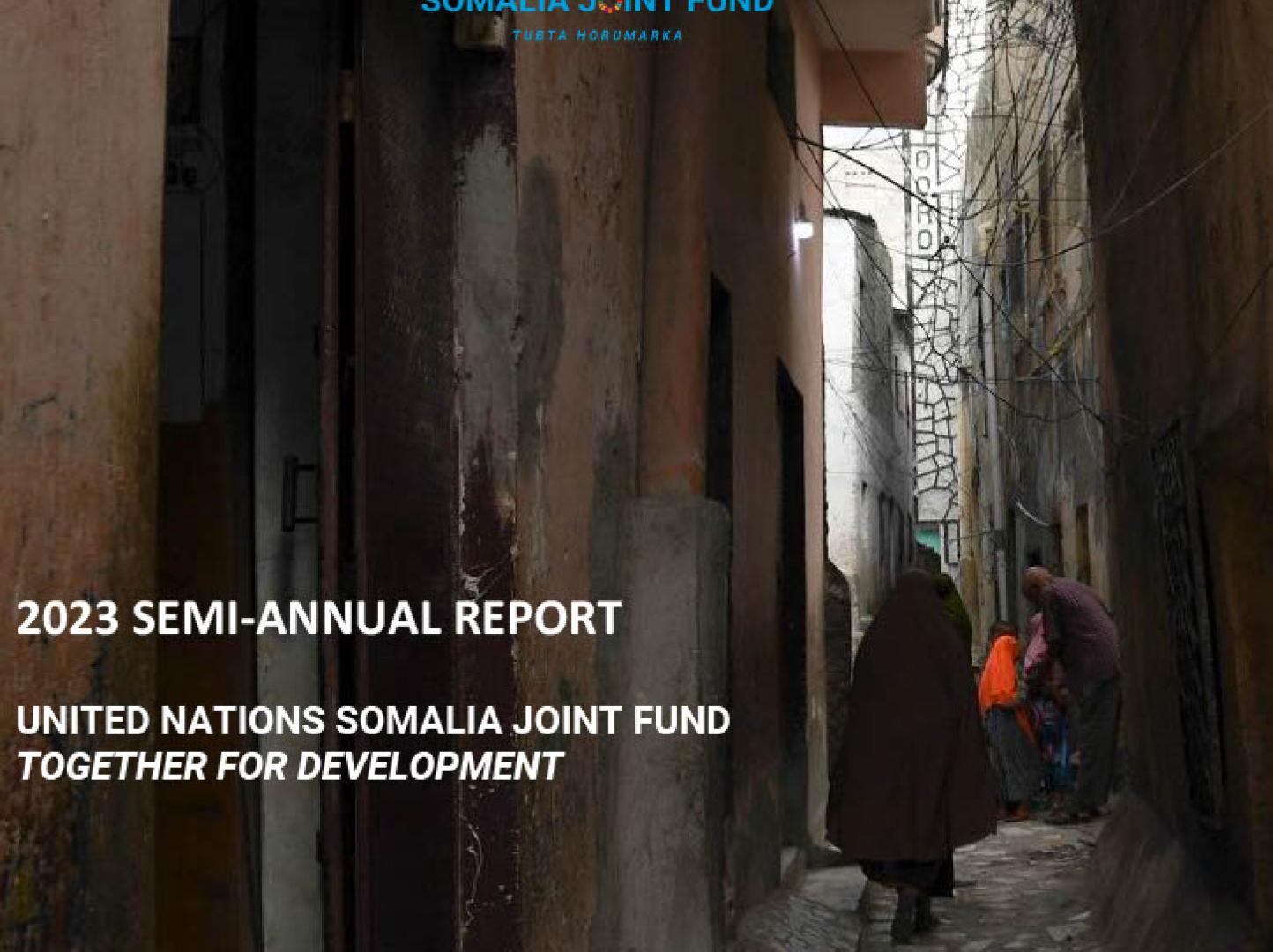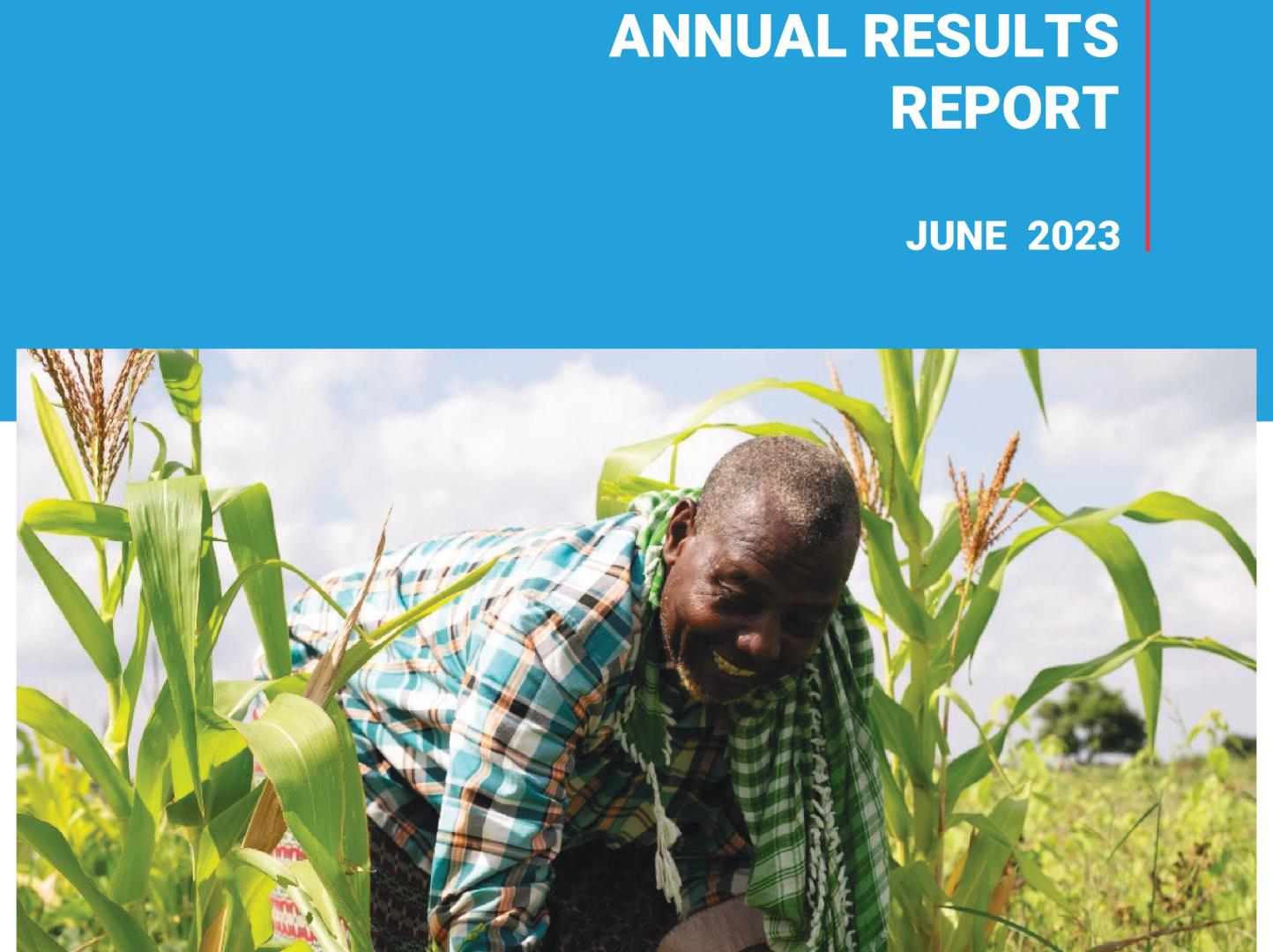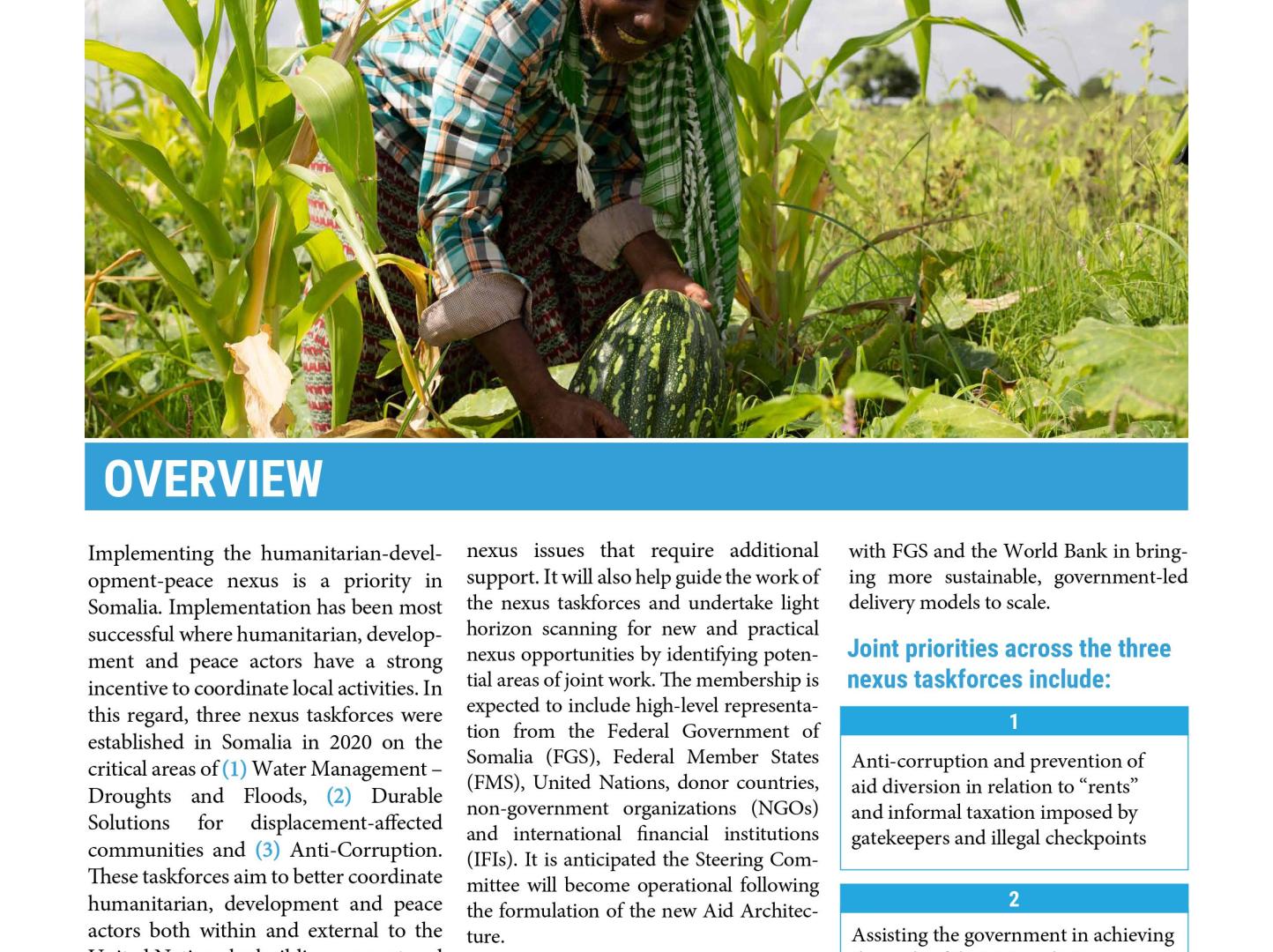Latest
Story
30 November 2025
A round-up of activities of the UN system in Somalia in November 2025
Learn more
Story
30 October 2025
A round-up of activities of the UN system in Somalia in October 2025
Learn more
Press Release
14 October 2025
Norway contributes NOK 45 million to advance Human Rights and Gender Equality in Somalia
Learn more
Latest
The Sustainable Development Goals in Somalia
The Sustainable Development Goals are a global call to action to end poverty, protect the earth’s environment and climate, and ensure that people everywhere can enjoy peace and prosperity. These are the goals the UN is working on in Somalia:
Story
19 November 2024
Irrigation project pour forth for displaced Somalis in Baidoa
Baidoa – Aden Sheikh Issack has a small allotment on an eight-acre communal farm in Barwaqo, a small settlement of internally displaced people (IDPs) on the outskirts of Baidoa in Somalia’s Bay region. He fled there when the conflict and hunger in his former residential area became too much to bear.At first, it was not easy surviving as a displaced person with large family but – with some external assistance – the farm has become productive and allows him to look after his wife and 11 children, as well as sell extra produce to local markets.The 50-year-old was proud to show off his farm recently to visit from the Somalia Joint Fund (SJF) – a multi-donor fund supporting Somalia’s development priorities. The visitors included representatives of the Somali government and the United Nations, and they had come to see firsthand the impact of the irrigation project which has ramped up the farmer’s output of maize, sugarcane and vegetables.“The irrigation project has been very beneficial, and we are already seeing its positive impact. I have been a beneficiary of this project since 2019 and I see better days ahead,” said Mr. Issack during the delegation’s recent visit to Barwaqo.Like Mr. Issack’s family, many local households have benefitted from the SJF’s Saameynta (transl.: ‘impact’) Programme – an eight-acre solar-powered, micro-irrigation drip serviced by a communal borehole, and set up to assist IDPs on land provided by the government.“This farm supports 57 families, with the smallest family having six members. This means we are talking about a minimum of 340 people. The total number is around 400 to 500 people and, out of the 57 families, 43 are led by women, including single mothers,” said the Director of Coordination and Monitoring in the federal government of Somalia’s Ministry of Planning, Mahamud Sicid Nur, told the visiting delegation.The four-year project will directly support 25,000 households and indirectly assist 150,000 people in South West State and Puntland, in the country’s north, by the end of 2025. International supportThe Saameynta Programme aims to provide durable solutions and scale up investments in mixed-use land development packages through drip irrigation, infrastructure improvement and small-scale business expansion. It is jointly implemented by the UN Development Programme (UNDP), the International Organisation for Migration (IOM) and the UN Human Settlements Programme (UN-Habitat), with funding provided through the SJF.According to the SJF’s manager, Peter Nordstrom, Saameynta has made important contributions to improving the economic status of displaced families. “The benefits of drip irrigation in arid or semi-arid environments are evident and its potential for creating sustainable livelihoods for communities is significant,” Mr. Nordstrom said.“At the same time,” he added, “access to land is at the heart of durable solutions for Somalia’s displacement crisis. Here in Barwaqo, the municipality has generously provided the land used for this communal farm but it is only serving a small portion of the IDP population.” Local authorities are keen to expand the project after having experienced its benefits.“In the past, we used to space the crops by about two metres when planting, but now we only space by 10 centimetres due to drip irrigation. This approach is new to us, and we are really impressed by the increased production,” Mr. Isaack told the visiting delegation.“Drip irrigation has also reduced our harvest times,” he continued. “We used to wait three months to harvest, but now we can harvest in just 15 days.”The trip was the SJF’s first joint UN-government monitoring mission, giving participants a firsthand look at the progress of ongoing programmes in the region. It was designed to explore synergies and to strengthen linkages within the SJF portfolio on the ground so as to facilitate more effective monitoring, foster learning and maximize impact through strategic collaboration and coordination between among the Federal Government of Somalia, local authorities and the United Nations.The visit also served as a platform for engaging directly with local authorities and community members.“Previously, displaced persons used to depend on aid, but now they have transitioned into farmers, producing their own food,” said the South West State’s Minister of Planning, Economic Development and International Cooperation, Hussein Mohamud Sheikh Hussein. “They are now food secure and sell any surplus to earn income,” he added. “This shows that we are gradually shifting from food dependency to self-sufficient farmers.”Critical funds Launched in 2023, the SJF is a multi-donor trust fund backed by Canada, Norway, Netherlands, Sweden, Switzerland and the European Union. It aims to strengthen partnership between the Somali Government, the United Nations and international partners in support of Somalia’s national development priorities and the achievement of the Sustainable Development Goals. Country-level pooled funds like the SJF are critical for the United Nations’ ability to better support development aspirations of the countries it operates in through the provision of the necessary flexibility to respond to complex challenges facing Somalia and to maximize synergies across the UN system through joint action.Originally established in 2014 and formerly known as Somalia Multi-Partner Trust Fund, the SJF is also one of the largest country-level development funds globally with more than $500 million in contributions since inception.
1 of 3
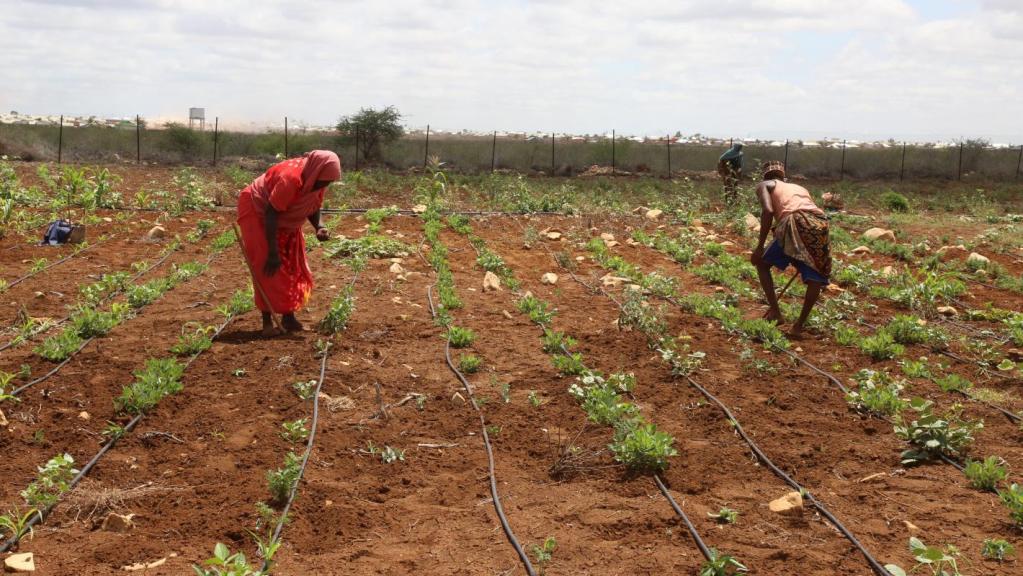
Press Release
02 July 2024
Federal Government of Somalia and United Nations convene the 2024 meeting of the Joint Steering Committee of the UN Cooperation Framework for Somalia (2021-2025)
The meeting of the Joint Steering Committee was co-chaired by the Minister for Planning, Investment and Economic Development, His Excellency, Mohamud A. Sheikh Farah (Beenebeene) and the UN Deputy Special Representative of the Secretary-General, Resident and Humanitarian Coordinator for Somalia, Mr. George Conway. His Excellency. Mohamud A. Sheikh Farah (Beenebeene) acknowledged the significance of the partnership in support of Somalia’s development priorities. “The Cooperation Framework is a testament to our strong partnership with the UN, driving forward our national development agenda and the Sustainable Development Goals (SDGs). We are committed to ensuring that the progress we make together translates into tangible improvements in the lives of the Somali people,” said, Minister, Mohamud.Speaking during the event, Mr. George Conway explained the annual Joint Steering Committee for the UN Cooperation Framework provides a platform to take stock and recalibrate our engagement to ensure alignment with the vision and aspirations of the country.“Five-year plans such as the UN Cooperation Framework are important to hold us accountable to commitments made. Under leadership of His Excellency the President, Somalia is conceiving a centennial Vision 2060 that seeks to capture Somali aspirations for their country. Providing a longer-term vision to guide short- and medium-term efforts will be helpful both in the finalization of the next National Transformation Plan as well as our next UN Cooperation Framework," said, Mr. Conway. The UN Sustainable Development Cooperation Framework (2021-2025) is the UN's multi-year strategic plan to guide the UN’s collective contribution to the realization of the 2030 Agenda for Sustainable Development and the Sustainable Development Goals in Somalia.—————————————————————————————————— FOR MEDIA INQUIRES: Communication Unit Department, Ministry of Planning, Investment and Economic Development | Email: Info@mop.gov.so Abdilatif Adan, Communications Specialist, UN Resident Coordinator Office in Somalia | Phone: +252614125028 | Email: abdilatif.adan@un.org | https://somalia.un.org/en |
1 of 3
Story
21 December 2021
Somalia is on the path of recovery, but real challenges remain
I arrived in Somalia in September 2019, two decades after having worked here previously. I knew that I was taking up a challenging assignment, but I was also looking forward to seeing Somalia’s progress. Afflicted by decades of conflict, recurrent climatic shocks, disease outbreaks and poverty, Somalia was often called a ‘failed state.’ The narrative is now changing, and although fragile, Somalia is on a path to stability and the resilience of the Somali people is second to none. That said, we are not under any illusion: significant challenges remain, and we must work even harder to preserve the gains made to date. Somalia’s upward trajectory is evident in the construction boom, as one analyst noted -- the sound of the hammer is replacing the sound of gunfire in Somalia’s capital.
The UN has been closely supporting the Somali people since the birth of the Republic in 1960. Currently, the UN's various mandates are implemented through 26 Agencies, Funds and Programmes (both resident and non-resident), one political mission (UNSOM) and one logistical support mission (UNSOS). The UN’s commitment towards the Somali cause is articulated in detail in the UN Sustainable Development Cooperation Framework (UNSDCF 2021-2025), mirroring the priorities of Somalia’s Ninth National Development Plan (NDP-9).
At the height of the COVID-19 pandemic, the UN marshalled support to help the Somali government respond to the virus outbreak. We continue to support the Somali authorities in seeking to defeat this pandemic and encouraging people to get vaccinated. Elections are also on-going in Somalia. The UN is supporting the process to ensure that elections are held in a peaceful and transparent manner, while at the same time advocating for 30 per cent women’s quota in the Somali legislature.
While these are encouraging signs of progress, we must not forget Somalia’s long-standing challenges. According to UN’s projections for next year, an estimated 7.7 million Somalis (nearly half of the country’s population) will require humanitarian assistance and protection. Women and children continue to bear the brunt of Somalia’s complex humanitarian crises, especially among the internally displaced communities. In light of the current serious droughts, the Somali government declared a humanitarian state of emergency on 23 November. Yet, neither the government nor the humanitarian community has adequate resources to respond. With a few days remaining in the year, the 2021 Humanitarian Response Plan which seeks US$1.09 billion remains only 70 per cent funded. Additional resources are urgently needed to prevent the dire humanitarian situation from becoming a catastrophe, so we continue to engage partners on this subject. In this regard, I undertook missions to Europe in October and to the Gulf in September. Throughout my interactions with partners, I stressed the need for additional funding to address Somalia’s escalating humanitarian crisis and elaborated on how inaction not only risks a reversal of the gains but puts the lives of millions of Somalis in jeopardy.
Through my field visits in Somalia, I have also seen first-hand the grim realities of adverse climate conditions. Somalia is no doubt on the frontline of climate change. The recurrent droughts and floods are driving widespread displacement, rapid urbanization, hunger, malnutrition and poverty. Climate change is also increasingly seen as the driver of conflict and a threat to the country’s security as the struggle over meagre resources deepens divisions. In addition, the loss of traditional livelihoods makes people vulnerable to recruitment by armed groups such as Al-Shabaab. Somalia is currently experiencing a third consecutive season of below-average rainfall, with nearly 80 per cent of the country experiencing drought conditions, water shortages and livestock deaths. One in five Somalis does not have enough water to cover his/her basic needs. On a positive note, as part of the efforts to mitigate the climate emergency, the government, with the support of the United Nations, has recently adopted an ambitious Nationally Determined Contribution to achieve global climate targets, in which Somalia committed to reduce its greenhouse gas emissions by 30 per cent by 2030.
Somalia’s crises are multifaceted, and they require comprehensive solutions from all stakeholders. It is our collective responsibility to support the efforts of the Somali people to cope with these crises and find lasting solutions that build resilience against future shocks. We must not fail the people we pledged to serve.
Adam Abdelmoula, Deputy Special Representative of the UN Secretary-General, Resident and Humanitarian Coordinator for Somalia, held a press conference on Monday, 20 December on the situation in Somalia, where the UN and partners is launching a nearly $1.5 billion Humanitarian Response Plan (HRP). Roughly 7.7 million people in the country will need assistance and protection in 2022, a 30 per cent rise in just one year.
Written by Adam Abdelmoula, Deputy Special Representative of the UN Secretary-General, Resident and Humanitarian Coordinator for Somalia
1 of 3
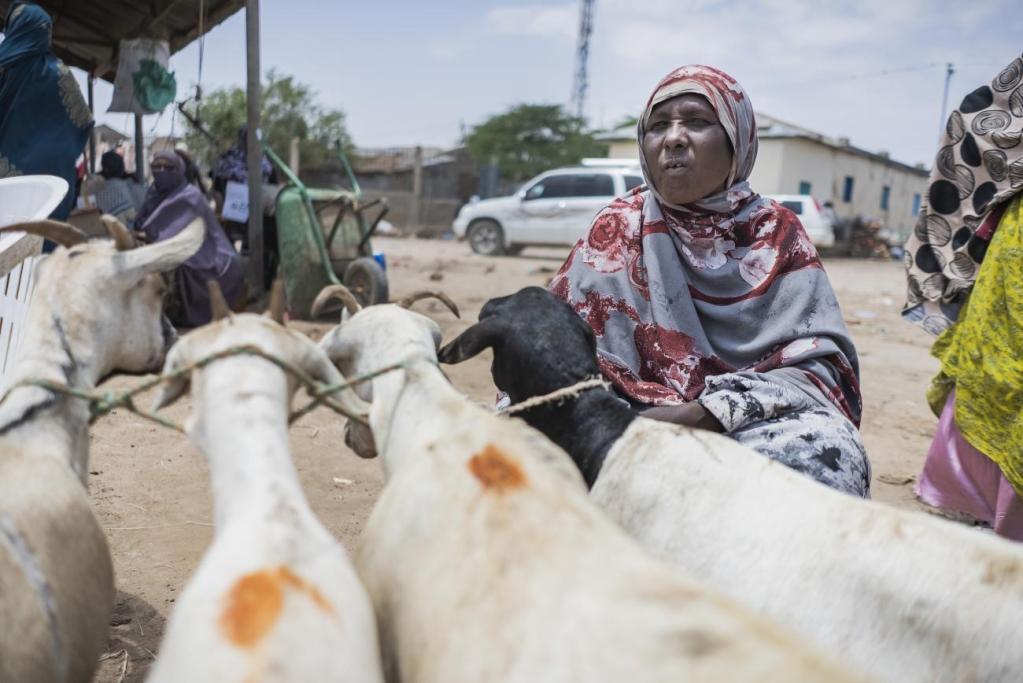
Story
30 November 2025
A round-up of activities of the UN system in Somalia in November 2025
Economy |UNIDO Empowers Somali Medium Small Enterprises Beyond BordersSomali entrepreneurs showcased the nation’s creativity and business potential on the international stage for the first time at the 25th East African Community (EAC) MSMEs Trade Fair in Nairobi, Kenya.Supported by the European Union, the delegation—led by the Ministry of Commerce & Industry and the Ministry of Agriculture & Irrigation—presented Made-in-Somalia products during the trade fair, symposium, and Somalia Day celebration, highlighting the country’s growing entrepreneurial talent.This initiative expanded regional market access, strengthened business networks, and elevated the visibility of Somali MSMEs across East Africa.Click here for more. Shelter| Advancing durable solutions through permanent shelter assistance in Baidoa and Dollow.
In November, UNHCR advanced its durable solutions efforts through the construction and handover of permanent shelters for displaced and returning families in Baidoa and Dollow. These solid, climate-appropriate shelters provide safer and more dignified living conditions, replacing temporary structures that offer limited protection. Implemented in close coordination with government counterparts and humanitarian partners, the shelter support enhances housing security, promotes stability, and enables families to rebuild their lives with greater confidence. This work reflects UNHCR’s continued commitment to sustainable, long-term solutions that strengthen community resilience and improve the overall well-being of displacement-affected populations across Somalia.Click here for more: Youth| UNTMIS supports youth dialogue The important contribution that Somali youth can make to their country’s future was highlighted in early November at a gathering of young people from civil society and representatives from the Somali government and the United Nations.“When we talk about what Somalis want, what the people want, what the future holds, it's very much a conversation that involves the youth. You are the most significant demographic cohort in the country,” UN Special Representative James Swan told the gathering in Mogadishu.“For the United Nations, in virtually all of our programming across the education sector, across the development sector, humanitarian response, there is always an emphasis and a concern on what this will mean for youth and how it will impact youth,” he added.The Youth Dialogue was organised by the Federal Ministry of Youth and Sports with UN support and brought together 40 young people from civil society groups.Click here for more. Environment| IOM supported Earth-Based Shelters Redefine Climate-Resilient SheltersAfter years of displacement driven by drought and conflict, many families in Doolow’s Ladan IDP site are finally accessing climate-adaptive, earth-based shelters that offer safety and comfort. Through training delivered with International Centre for Earth Construction (CRAteree) and local authorities, IOM has equipped masons and community members with mudbrick construction skills and supported families through a cash-for-shelter approach. Since 2022, dozens of shelters have been upgraded using local materials, creating jobs and strengthening community resilience. For families like Hawo’s, culturally familiar shelters are restoring dignity, stability, and a sense of home.Click here for more. Health| WHO supports sustainable health services in Somalia amid unprecedented funding challengesDecades of conflict, recurrent climate shocks, disease outbreaks, and widespread displacement have left millions of Somalis without access to basic health and nutrition care. Somalia has some of the worst health indicators globally, including high maternal and child mortality rates and widespread malnutrition. The country’s health infrastructure is heavily reliant on international aid. Currently, 95% of Somalia’s health care funding is supported by external donors, leaving the entire health system vulnerable to shifts in global financing. Recent funding cuts have placed immense pressure on essential health and nutrition services. In this challenging context, the World Health Organization (WHO) plays a central role in supporting health and nutrition services and protecting vulnerable populations.Click here for more. Protection| UNICEF Somalia marks10 years since ratifying the Convention on the Rights of the ChildOn this year's World Children's Day on 20th November, Somalia commemorated the 10th anniversary of the ratification of the UN Convention on the Rights of the Child. At an event in Mogadishu attended by several cabinet ministers, parliamentarians, the UN, civil society, and hundreds of children, the Prime Minister H.E. Hamza Abdi Barre called for collective efforts to combat threats to children, such as irregular migration, violent extremism, and drugs and substance abuse. "If the children's future is not well protected and their rights not addressed, our country will still be in the same situation." He committed to ensuring that all outstanding child legislation was passed.Representatives of the children called for expanded access to education and opportunities for children with disability, saying time for action was now. The UNICEF Representative Sandra Lattouf called for stronger public, private and community partnerships to address the barriers to progress.Click here for more. Stabilization| Somalia and partners chart a joint path for stronger peacebuilding and stability efforts.More than 40 different entities, including the government, civil society, and development partners have agreed to develop a coordinated framework for stabilization in Somalia — bringing all efforts on stabilization, peacebuilding, reconciliation, and the prevention of violent extremism under one national framework as envisioned in the National Transformation Plan (NTP).This consensus emerged from a high-level workshop organized by the Government of Somalia and UNDP in Nairobi, bringing together senior representatives from the key ministries and government institutions, representatives of the embassies and international organizations, civil society and think tank community. The actors agreed to harmonize all existing approaches into a single realistic framework aligned with the national priorities (the NTP) that is responsive to shifting political and institutional dynamics.Click here for more.
In November, UNHCR advanced its durable solutions efforts through the construction and handover of permanent shelters for displaced and returning families in Baidoa and Dollow. These solid, climate-appropriate shelters provide safer and more dignified living conditions, replacing temporary structures that offer limited protection. Implemented in close coordination with government counterparts and humanitarian partners, the shelter support enhances housing security, promotes stability, and enables families to rebuild their lives with greater confidence. This work reflects UNHCR’s continued commitment to sustainable, long-term solutions that strengthen community resilience and improve the overall well-being of displacement-affected populations across Somalia.Click here for more: Youth| UNTMIS supports youth dialogue The important contribution that Somali youth can make to their country’s future was highlighted in early November at a gathering of young people from civil society and representatives from the Somali government and the United Nations.“When we talk about what Somalis want, what the people want, what the future holds, it's very much a conversation that involves the youth. You are the most significant demographic cohort in the country,” UN Special Representative James Swan told the gathering in Mogadishu.“For the United Nations, in virtually all of our programming across the education sector, across the development sector, humanitarian response, there is always an emphasis and a concern on what this will mean for youth and how it will impact youth,” he added.The Youth Dialogue was organised by the Federal Ministry of Youth and Sports with UN support and brought together 40 young people from civil society groups.Click here for more. Environment| IOM supported Earth-Based Shelters Redefine Climate-Resilient SheltersAfter years of displacement driven by drought and conflict, many families in Doolow’s Ladan IDP site are finally accessing climate-adaptive, earth-based shelters that offer safety and comfort. Through training delivered with International Centre for Earth Construction (CRAteree) and local authorities, IOM has equipped masons and community members with mudbrick construction skills and supported families through a cash-for-shelter approach. Since 2022, dozens of shelters have been upgraded using local materials, creating jobs and strengthening community resilience. For families like Hawo’s, culturally familiar shelters are restoring dignity, stability, and a sense of home.Click here for more. Health| WHO supports sustainable health services in Somalia amid unprecedented funding challengesDecades of conflict, recurrent climate shocks, disease outbreaks, and widespread displacement have left millions of Somalis without access to basic health and nutrition care. Somalia has some of the worst health indicators globally, including high maternal and child mortality rates and widespread malnutrition. The country’s health infrastructure is heavily reliant on international aid. Currently, 95% of Somalia’s health care funding is supported by external donors, leaving the entire health system vulnerable to shifts in global financing. Recent funding cuts have placed immense pressure on essential health and nutrition services. In this challenging context, the World Health Organization (WHO) plays a central role in supporting health and nutrition services and protecting vulnerable populations.Click here for more. Protection| UNICEF Somalia marks10 years since ratifying the Convention on the Rights of the ChildOn this year's World Children's Day on 20th November, Somalia commemorated the 10th anniversary of the ratification of the UN Convention on the Rights of the Child. At an event in Mogadishu attended by several cabinet ministers, parliamentarians, the UN, civil society, and hundreds of children, the Prime Minister H.E. Hamza Abdi Barre called for collective efforts to combat threats to children, such as irregular migration, violent extremism, and drugs and substance abuse. "If the children's future is not well protected and their rights not addressed, our country will still be in the same situation." He committed to ensuring that all outstanding child legislation was passed.Representatives of the children called for expanded access to education and opportunities for children with disability, saying time for action was now. The UNICEF Representative Sandra Lattouf called for stronger public, private and community partnerships to address the barriers to progress.Click here for more. Stabilization| Somalia and partners chart a joint path for stronger peacebuilding and stability efforts.More than 40 different entities, including the government, civil society, and development partners have agreed to develop a coordinated framework for stabilization in Somalia — bringing all efforts on stabilization, peacebuilding, reconciliation, and the prevention of violent extremism under one national framework as envisioned in the National Transformation Plan (NTP).This consensus emerged from a high-level workshop organized by the Government of Somalia and UNDP in Nairobi, bringing together senior representatives from the key ministries and government institutions, representatives of the embassies and international organizations, civil society and think tank community. The actors agreed to harmonize all existing approaches into a single realistic framework aligned with the national priorities (the NTP) that is responsive to shifting political and institutional dynamics.Click here for more.
1 of 5

Story
30 October 2025
A round-up of activities of the UN system in Somalia in October 2025
Protection| Advancing durable solutions and hope through the Assisted Spontaneous Return programme.Through the Assisted Spontaneous Return (ASR) programme, UNHCR working alongside the Government of Somalia and partners continues to facilitate the safe and dignified return of Somali refugees from Yemen. Each return marks a new beginning for families rebuilding their lives after years of displacement. Beyond reception assistance, UNHCR provides protection, health, and reintegration support, helping returnees reintegrate within their communities and regain stability. The ASR initiative underscores UNHCR’s broader commitment to durable solutions, resilience, and hope for displacement-affected populations across Somalia.
Click here for more.
Human Rights| UN Mission’s Human Rights Chief visits Galmudug StateIn early October, as part of UNTMIS’ support for the development of human rights across Somalia, the UN Mission’s human rights chief, Kirsten Young, visited Galmudug State where she met with its President Ahmed Abdi Karie ‘Qoorqoor’ and other officials, including the newly appointed Minister of Women and Human Rights Development, and a wide range of civil society representatives. Their discussions covered human rights priorities in the Federal Member State, implementation of the law against female genital mutilation, finalisation of the draft disability and child rights bills, and progress on the media law.Click here for more Health| World Polio Day Commemoration in SomaliaSomalia marked World Polio Day at Banadir Hospital in Mogadishu on 26th October 2025 under the theme “End Polio: Every Child, Every Vaccine, Everywhere.” Organized by the Federal Ministry of Health and Human Services in collaboration with WHO and UNICEF, the event reaffirmed Somalia’s commitment to interrupting polio transmission and reaching every child with life-saving vaccines.Over 80 stakeholders, including government officials, WHO and UNICEF representatives, health associations, and community leaders, gathered to review progress, address challenges, and strengthen eradication strategies. Highlights included keynote speeches on sustaining high immunity, technical updates on zero-dose mapping, and recognition of the important role of frontline health workers. A polio survivor shared a powerful testimony, underscoring the importance of vaccination.Renewed pledges were made to intensify immunization efforts, enhance surveillance, and mobilize communities—ensuring that no child is left behind as Somalia moves towards a polio-free future.Click here for more. Security| UNMAS delivers Training-of-Trainers on IED Risk Education to Somali Police ForceUNMAS Somalia delivered a two-day Training-of-Trainers workshop on Improvised Explosive Devices (IED) risk education to the Explosive Ordnance Disposal unit of the Somali Police Force. Equipping these officers with comprehensive skills and knowledge to effectively raise awareness about the risks associated with IEDs will enable them to deliver impactful IED risk education both within their unit and to the broader communities affected by the presence of IEDs.Throughout the training, participants engaged in a variety of instructional methods, including lectures, hands-on exercises, and group discussions. This multifaceted approach ensured that they not only understood the theoretical aspects of IED risks but also learned how to communicate this vital information efficiently. The training created a network of informed trainers who could disseminate essential safety knowledge, thereby enhancing community resilience and contributing to overall public safety in regions vulnerable to IED threats.Click here for more. Economy| UNIDO Empowers the Next Generation of Somali Innovators UNIDO held graduation ceremonies in Mogadishu and Hargeisa for 57 young entrepreneurs from the first cohort of the BIC Somali Project, funded by the European Union. The graduates successfully completed a comprehensive training and mentorship programme, marking a significant milestone in their entrepreneurial journey. The initiative equips aspiring entrepreneurs with the skills, tools, and confidence to transform innovative ideas into thriving, sustainable businesses. This achievement represents a major step toward building a resilient private sector, fostering job creation, innovation, and inclusive economic growth across Somalia. UNIDO proudly champions inclusive support mechanisms, technical assistance, and resource mobilization to help Somali startups thrive.Click here for more. Health| Mothers lead the way to a polio-free SomaliaAcross Somalia, mothers from all walks of life are helping to build a healthier future for their children by protecting them from polio. Layla joined efforts to reach families in Mogadishu’s Hodan district with vaccines in July 2019. Armed with her vaccine carrier, a winning smile and strong sense of purpose, she is among the many Somali mothers who have become vaccinators and health educators in their communities. Click here for more. Health| One Man’s Quest to Transform Mental Health Services in SomalilandPsychiatrist Dr Yacoub Aden Abdi returned to Somaliland in 2019, through IOM's Migration for Development in Africa (MIDA) programme, to transform Somaliland’s mental health care system. Advocating for the first mental health budget in Somaliland, Dr. Yacoub managed to convince the government to allocate US$2 million annually which helped in the recruitment of over 200 health care professionals and built new mental health divisions in hospitals across six regions, which included Erigavo’s first mental health hospital. Click here for more.
Click here for more.
Human Rights| UN Mission’s Human Rights Chief visits Galmudug StateIn early October, as part of UNTMIS’ support for the development of human rights across Somalia, the UN Mission’s human rights chief, Kirsten Young, visited Galmudug State where she met with its President Ahmed Abdi Karie ‘Qoorqoor’ and other officials, including the newly appointed Minister of Women and Human Rights Development, and a wide range of civil society representatives. Their discussions covered human rights priorities in the Federal Member State, implementation of the law against female genital mutilation, finalisation of the draft disability and child rights bills, and progress on the media law.Click here for more Health| World Polio Day Commemoration in SomaliaSomalia marked World Polio Day at Banadir Hospital in Mogadishu on 26th October 2025 under the theme “End Polio: Every Child, Every Vaccine, Everywhere.” Organized by the Federal Ministry of Health and Human Services in collaboration with WHO and UNICEF, the event reaffirmed Somalia’s commitment to interrupting polio transmission and reaching every child with life-saving vaccines.Over 80 stakeholders, including government officials, WHO and UNICEF representatives, health associations, and community leaders, gathered to review progress, address challenges, and strengthen eradication strategies. Highlights included keynote speeches on sustaining high immunity, technical updates on zero-dose mapping, and recognition of the important role of frontline health workers. A polio survivor shared a powerful testimony, underscoring the importance of vaccination.Renewed pledges were made to intensify immunization efforts, enhance surveillance, and mobilize communities—ensuring that no child is left behind as Somalia moves towards a polio-free future.Click here for more. Security| UNMAS delivers Training-of-Trainers on IED Risk Education to Somali Police ForceUNMAS Somalia delivered a two-day Training-of-Trainers workshop on Improvised Explosive Devices (IED) risk education to the Explosive Ordnance Disposal unit of the Somali Police Force. Equipping these officers with comprehensive skills and knowledge to effectively raise awareness about the risks associated with IEDs will enable them to deliver impactful IED risk education both within their unit and to the broader communities affected by the presence of IEDs.Throughout the training, participants engaged in a variety of instructional methods, including lectures, hands-on exercises, and group discussions. This multifaceted approach ensured that they not only understood the theoretical aspects of IED risks but also learned how to communicate this vital information efficiently. The training created a network of informed trainers who could disseminate essential safety knowledge, thereby enhancing community resilience and contributing to overall public safety in regions vulnerable to IED threats.Click here for more. Economy| UNIDO Empowers the Next Generation of Somali Innovators UNIDO held graduation ceremonies in Mogadishu and Hargeisa for 57 young entrepreneurs from the first cohort of the BIC Somali Project, funded by the European Union. The graduates successfully completed a comprehensive training and mentorship programme, marking a significant milestone in their entrepreneurial journey. The initiative equips aspiring entrepreneurs with the skills, tools, and confidence to transform innovative ideas into thriving, sustainable businesses. This achievement represents a major step toward building a resilient private sector, fostering job creation, innovation, and inclusive economic growth across Somalia. UNIDO proudly champions inclusive support mechanisms, technical assistance, and resource mobilization to help Somali startups thrive.Click here for more. Health| Mothers lead the way to a polio-free SomaliaAcross Somalia, mothers from all walks of life are helping to build a healthier future for their children by protecting them from polio. Layla joined efforts to reach families in Mogadishu’s Hodan district with vaccines in July 2019. Armed with her vaccine carrier, a winning smile and strong sense of purpose, she is among the many Somali mothers who have become vaccinators and health educators in their communities. Click here for more. Health| One Man’s Quest to Transform Mental Health Services in SomalilandPsychiatrist Dr Yacoub Aden Abdi returned to Somaliland in 2019, through IOM's Migration for Development in Africa (MIDA) programme, to transform Somaliland’s mental health care system. Advocating for the first mental health budget in Somaliland, Dr. Yacoub managed to convince the government to allocate US$2 million annually which helped in the recruitment of over 200 health care professionals and built new mental health divisions in hospitals across six regions, which included Erigavo’s first mental health hospital. Click here for more.
1 of 5

Story
30 September 2025
A round-up of activities of the UN system in Somalia in September 2025
Immunization| Private hospitals to offer free vaccination to children in Somaliland Private hospitals in Hargeisa have signed a Memorandum of Understanding with the Somaliland Ministry of Health Development to provide free vaccines for children across private facilities that handle tens of thousands of births annually. This important partnership allows children aged below five years to be vaccinated free of charge at private hospitals. These efforts will in turn strengthen child health services and prevent vaccine preventable diseases like measles, polio and pneumonia. Initially, 8 major private hospitals based in Hargeisa have signed the MOU and the arrangement will be overseen by the Private Hospitals Umbrella. Other private hospitals located in cities like Borama, Berbera, Burao and Erigavo are expected to come on board in the coming months. The expansion of the immunization efforts through private hospitals will increase the number of service centres where children can access vaccination. More access points mean fewer children dying of preventable diseases. UNICEF advocated for and facilitated the signing of the MOU. Click here for more. Security |UNMAS hands over Explosive Ordnance Disposal equipment to the Somali National Army On 11 September, UNMAS and the Government of the United Kingdom officially handed over UK-funded explosive ordnance disposal (EOD) equipment to the Somali National Army (SNA) under the project “Strengthening the EOD Capacity of the SNA”. The new equipment will advance national security by enabling the SNA to conduct effective explosive hazard interventions, protect civilians, and strengthen the operational capacity of EOD teams during military operations. Implemented by UNMAS Somalia, with funding from the UK, the project focuses on enhancing and sustaining the SNA’s EOD capabilities. The handover was attended by Somalia’s Minister of Defence, the Chief of Defence Forces, the British Ambassador, and the UNMAS Chief.Click here for more Human Rights| UNTMIS supports Somali MPs in building inclusive and transparent budgeting skillsAt the request of the Ministry of Family and Human Rights Development, UNTMIS and the Office of the High Commissioner for Human Rights supported a three-day training in Mogadishu for 20 parliamentarians from Somalia’s federal and member state legislatures. The training focused on human rights-based public budget analysis and equipping lawmakers with tools to integrate rights principles into budget processes. Through strengthening the parliamentarians’ capacity, the initiative sought to promote inclusive, transparent, and accountable governance aligned with Somalia’s human rights obligations.Parliamentarians also engaged in discussions with civil society actors, exchanging experiences on budget oversight and best practices. Case studies explored how fiscal decisions affect vulnerable groups, including women, children, persons with disabilities, minorities, and displaced populations. The sessions underscored the importance of directing national resources to advance equality, protect rights, and meet the needs of marginalised communities, supporting Somalia’s broader agenda for sustainable, rights-based development.Click here for more. Economy| UNIDO empowers young Somali entrepreneurs with the technology needed for sustainable growth With support from the European Union, UNIDO successfully conducted Phase 1 of the Equipment Grant Distribution in Mogadishu for the first cohort winners of the BIC Somali Project. Eighteen outstanding trainees received essential equipment to enhance their operational capacity, contributing to the local economic growth, job creation, and a stronger innovation ecosystem. By fostering equal opportunities, this major milestone marks a significant step towards strengthening business resilience and promoting private sector development. UNIDO proudly champions inclusive support mechanisms, capacity building, and resource mobilization to help Somali startups thrive. Click here for more. Protection| UNHCR supports conflict-affected families in Hirshabelle with essential household items.In September, UNHCR, with the support of its Shelter Cluster partner, Juba Foundation, began distributing Non-Food Items to 350 conflict-affected households in Jalalaqsi, Hirshabelle State. The assistance includes essential household items that help families meet their immediate needs and restore a sense of normalcy after displacement. By working with local partners, UNHCR strengthens community-level response capacity while ensuring that timely and life-saving support reaches the most vulnerable. This intervention not only provides relief in the face of conflict-related hardships but also reinforces resilience and protection for affected communities in Hirshabelle.Click here for more. Peacebuilding| New eco-friendly women's centre to strengthen peace and resilience in JubalandTo empower women and promote social cohesion and resilience, IOM handed over a Women’s Resource and Training Centre in Abdalla Birole, Jubaland State. The eco-friendly centre built with sustainable features like a rooftop rainwater harvesting system, solar panels and a permagarden for local food production, offers a dedicated space for women to learn and connect. It provides access to training, income-generating opportunities and facilities including a sewing room, salon, cafeteria, office and community gathering areas, all aimed at promoting self-reliance. Click here for more. Peacebuilding| UNDP and KOICA strengthen partnership to prevent violent extremism in Somalia.Since 2006, KOICA and UNDP have worked together on development and humanitarian projects, with a strong focus on governance and peacebuilding. Building on this long-standing partnership, the two organizations are expanding their collaboration to advance peacebuilding and prevent violent extremism across the East African sub-region, with a particular emphasis on Somalia. This joint initiative aims to promote stability, strengthen community resilience, and foster sustainable peace.Click here for more.
1 of 5

Story
30 August 2025
A round-up of activities of the UN system in Somalia in August 2025
Security| UNSOS trains Somali Security Forces personnel on IT systems to enhance operational capabilitiesThe United Nations Support Office in Somalia (UNSOS) has completed a six-week On-the-Job Training (OJT) programme for Somali Security Forces (SSF), equipping them with the skills to understand and operate emerging information technology solutions to enhance their operations.Eight personnel from the Somali National Armed Forces (SNAF) and the Somali Police Force (SPF) attended the training from 23 June to 7 August, conducted by UNSOS Field Technology Section (UNSOS-FTS).UNSOS-FTS Chief of Service Management Unit, Paul Irefo, said the initiative is part of a strategic investment in Somalia’s security and operational resilience, executed under a tripartite memorandum of understanding signed with the African Union Support and Stabilisation Mission in Somalia (AUSSOM), United Nations (UN), and the Federal Government of Somalia (FGS).Click here for more Shelter| UNHCR hands over transitional shelters to IDPsIn August, UNHCR Somalia, in partnership with AVORD, handed over transitional shelters to displaced families at the Lawilley IDP site in Baidoa. These shelters provide safer living conditions and a renewed sense of stability for families who have been living in overcrowded and precarious environments. Representing a vital step towards recovery and long-term solutions, the shelters support families in moving beyond temporary arrangements toward lasting security and dignity. Through such interventions, UNHCR continues to strengthen protection and resilience for displacement-affected communities in Baidoa, supporting their journey from emergency response to sustainable recovery.Click here for more Civil rights| Somalia expands birth registration The UN Convention on the Rights of the Child confers on every child the right to be registered 'immediately after birth'.The reality is that millions of children in Somalia have never been registered. According to the 2020 Somalia Demographic and Health Survey, only 3 per cent of children under the age of five have had their births registered, and only 0.3 per cent possess a birth certificate.Without this legal proof of identity, these children, particularly those from internally displaced communities, face exclusions and higher risks of exploitation and abuse. Yet Somalia is taking historic steps to modernize its Civil Registration and Vital Statistics (CRVS) system - creating a clear pathway for every child to be seen, counted, and protected. Leading the charge is the Ministry of Interior Affairs and Federal Reconciliation, supported by UNICEF and collaborating with federal member states. In 2024, a pilot digital CRVS system was launched in 19 districts covering 158 health facilities. In 2025, the system has been scaled up to 29 additional districts, an effort that has seen over 43,000 children registered. Click here for more Technology| UNIDO empowers Somali youth and women with transformative skills through technology training and mentoring With support from the European Union, UNIDO has conducted intensive tech skills training in Mogadishu and Hargeisa for 54 participants in the second cohort of its BIC Somali Project, aimed at boosting business productivity, efficiency, and job creation. Key training sessions covered post-harvest handling, drying and storage, and greenhouse farming; hybrid renewable energy systems (solar panels, wind, and diesel integration); practical applications of AI, web development, and digital marketing; as well as financial planning, budgeting, cost optimization and pricing, and customer care strategies. These initiatives promote innovative entrepreneurship, inclusive growth, resilience, and sustainable livelihoods across Somalia. Click here for more. Youth| UNFPA Supports Somali Youth in Commemorating International Youth DayDespite challenges like conflict, climate shocks, and unemployment, Somali youth are emerging as powerful agents of change. Rejecting violence, they are driving innovation, promoting peace, and tackling issues such as gender inequality and climate action. On 12 August 2025, Somalia marked International Youth Day in Mogadishu, an event supported by KOICA and attended by senior government officials alongside UNFPA representatives. The celebration highlighted the essential role of young people’s voices and leadership in building an equitable, peaceful, and sustainable Somalia. UNFPA, in partnership with the Government, champions youth rights and empowerment by establishing Youth-Friendly Centres that provide sexual and reproductive health services, vocational training, and digital literacy programs. It also supports the development of policies to ensure young people have the tools, opportunities, and support systems needed to shape their futures and contribute meaningfully to peace and sustainable development across the country.Click here for more. Health| WHO supported polio campaign reaches more than 1.5 million children in northern SomaliaMore than 1.5 million children under 5 received the novel oral polio vaccine type 2 (nOPV2) in Somaliland and Puntland during the second round of a nationwide vaccination campaign. The campaign – part of Somalia’s ongoing efforts to end polio once and for all – launched on 24 August in Somaliland, where health teams successfully vaccinated 852,000 children – from urban and remote rural communities – with nOPV2. In Puntland, the campaign began on 26 August and protected 676,000 children across all districts, including in hard-to-reach areas where access to health care is limited. In both states, the campaign was led by the respective ministries of health, in collaboration with the World Health Organization (WHO), the United Nations Children’s Fund (UNICEF), and Global Polio Eradication Initiative (GPEI) partners.Click here for more.
1 of 5

Story
31 July 2025
A round-up of activities of the UN system in Somalia in July 2025
UN congratulates Somalia on 65th anniversary of independenceOn the occasion of the 65th anniversary of Somalia’s independence, marked on 1 July, the United Nations congratulated the people and government of Somalia and commended the nation’s progress since 1960."Somalia has much to be rightfully proud of, including achievements in advancing peace, prosperity, and governance despite facing great challenges,” the UN Secretary-General’s Special Representative for Somalia, James Swan, said in a message.“On behalf of the United Nations family in Somalia, I say ‘hambalyo,’ on this significant day, and reaffirm the UN’s commitment to supporting Somalia as it strives for even greater progress in the years to come,” he added.Click here for more. UNICEF supports the installation of solar powered cold chains unitsIn a bid to strengthen Somalia’s health system, the Federal Ministry of Health, in collaboration with UNICEF, has installed 148 solar-powered cold chain units across the country, thanks to funding from the World Bank.This investment is part of a broader cold chain rehabilitation plan, which will increase the number of health facilities with functional cold chain equipment from 959 in 2023 to 1,117 by the end of 2025, and raise immunisation coverage from 77% to 96%. These climate-sensitive units include cold rooms, dual-function refrigerators, and ultra-low temperature freezers.To ensure sustainability, remote temperature monitoring devices have been deployed, and 89 regional cold chain managers have been trained, with additional capacity-building efforts underway. This initiative represents a significant step towards building robust and accessible health infrastructure in Somalia, ensuring life-saving vaccines reach every child, even in remote areas. Chick here for more. UNHCR champions refugee entrepreneurs at the 5th Entrepreneurship Summit
In July, UNHCR Somalia participated in and sponsored the 5th Entrepreneurship Summit under the theme “Investing in Human Capital Development.” The event provided a platform to spotlight refugee entrepreneurs who shared compelling stories of resilience, innovation, and talent. Their active participation emphasized the vital role refugees play in local economies and the importance of inclusive investment. By supporting such forums, UNHCR continues to promote refugee self-reliance, restore dignity, and build stronger, more inclusive communities. The summit also reinforced the value of private sector engagement in advancing durable solutions for displaced populations. Click here for more.
UNDP participates in the Global Somali Entrepreneurship summitThe Global Somali Entrepreneurship Forum (GSEF2025) kicked off in Nairobi, Kenya, bringing together Somali entrepreneurs, investors, and international partners to shape a stronger, more inclusive business environment for Somalia’s future.At GSEF2025, UNDP Somalia hosted a dedicated side event on "Enhancing the Business Environment and Opportunities in Somalia."Panelists from Visa, the Somali Chamber of Commerce, the Somali Stock Exchange, SIMAD University, and One Earth Future shared powerful insights on how policy reforms, institutional development, and private sector engagement can drive sustainable economic transformation.Click here for more. UNOPs supports construction of emergency health unitsUNOPS and Somalia’s Ministry of Health have launched the construction of new emergency health units at Bay Regional Hospital in Baidoa, including an Accident and Emergency Unit, Intensive Care Unit, Minor Operation Theatre and X-ray Department. These efforts are part of a World Bank-financed initiative to build emergency response capacity at six hospitals across Somalia and includes climate-smart features to enhance health system resilience.UNOPS has also supported the construction a new Vaccine Storage Cold Chain Facility at Forlanini Hospital in Mogadishu. The facility is designed to improve vaccine storage and distribution during emergencies. Both projects demonstrate a coordinated effort to strengthen Somalia’s healthcare infrastructure and emergency preparedness.Click here for more. Somalia Opens First Indigenous Seed Bank in MogadishuTo strengthen Somalia’s climate resilience, preserve indigenous seeds, protect biodiversity and regenerate native plant species, the City University of Mogadishu, with support from IOM, has launched the country’s first indigenous seed bank. The seed bank helps to conserve indigenous knowledge and farming practices, supports women as key custodians of seeds, and enhances food security. It holds seeds contributed by members of the Balacad Community Seed Bank established by the International Organization for Migration (IOM), whose members are drawn from different, often conflicting, communities - fostering trust and promoting collaboration among the members of the communities, including women.Click here for more. Somalia’s child immunization rates more than doubled in 2024, a new report findsSomalia is closing the immunization gap with 70% of children now fully vaccinated—an increase of 28% from 2012 to 2024. This progress is driven by strong leadership from the Ministry of Health, in collaboration with WHO Somalia, UNICEF Somalia, and global partners. The annual WHO/UNICEF Estimates of National Immunization Coverage (WUENIC) released in July showcases improvements across all antigens since 2019. WUENIC provides country-level datasets on key infant and childhood vaccinations, highlighting areas of progress, opportunities for further enhancement, and any declines in coverage.Click here for more. UNIDO Champions Public-Private Dialogue for Vision 2060UNIDO Somalia, in collaboration with the National Economic Council (NEC), convened the Private Sector Development Pillar Workshop in Mogadishu as part of the national Centennial Vision 2060 (CV2060) implementation process. The workshop brought together over 60 participants from government institutions, financial bodies, private sector actors, innovation hubs, and diaspora representatives to assess policy priorities and structural challenges facing Somalia’s private sector. Key discussions addressed regulatory and financial barriers impacting start-ups and SMEs, intellectual property protection, and Somalia’s readiness to compete in regional and international markets. UNIDO Somalia led two high-level panel sessions highlighting priority reforms and investments to unlock the full potential of start-ups and SMEs. Insights gathered during the workshop will contribute directly to the CV2060 implementation roadmap. UNIDO was recognized for its leadership and continued commitment to fostering an inclusive, innovation-driven private sector in Somalia.Click here for more. UNMAS strengthens community awareness of explosive threats in Hirshabelle.In collaboration with IOM, UNMAS Somalia has successfully conducted a two-day explosive ordnance (EO) and Improvised Explosive Device (IED) awareness course in Mogadishu under the Collaborative Safety and Security Framework project of IOM.UNMAS trained 20 community representatives from Maqakori, Adan Yabaal, and Masjid Aligadud of Hirshabelle region to strengthen community knowledge on explosive threats, including landmines, IEDs, and explosive remnants of war. The representatives will pass on safety messages to their community members in hopes of identifying and reporting EO, promoting safe behaviour, reducing casualties, and enabling safer returns. As armed conflict continues to impact the civilian population in Hirshabelle, this training is a critical step towards reducing civilian casualties and fostering safer and more resilient communities.Click here for more. FAO launches Identification documents for fishermen In a key step for fisheries information management, the FAO, the World Bank, and Jubaland's Ministry of Fisheries successfully launched identification document (ID), for fishermen across the state under the Somalia Crisis Recovery Project. This initiative is a crucial part of FAO’s BlueTransformation efforts, as it helps to formalize and better manage the fisheries sector. The new ID cards will provide accurate data, ensuring that policies and support programs effectively reach the right communities and contribute to the sustainable development of the sector.Click here for more.
UNFPA and NHPC Lead Capacity-Building WorkshopUNFPA Somalia, in partnership with the Somalia National Health Professions Council (NHPC), co-hosted a transformative four-day workshop to strengthen NHPC staff’s capacity to roll out Somalia’s new Midwifery Regulatory Framework. Through interactive modules on educational accreditation, licensing procedures, continuous professional development (CPD), and ethical practice, participants gained hands-on tools and strategic insights to ensure that Somali midwives are rigorously trained, duly licensed, ethically accountable, and committed to lifelong learning in maternal and newborn care. Click here for more.
In July, UNHCR Somalia participated in and sponsored the 5th Entrepreneurship Summit under the theme “Investing in Human Capital Development.” The event provided a platform to spotlight refugee entrepreneurs who shared compelling stories of resilience, innovation, and talent. Their active participation emphasized the vital role refugees play in local economies and the importance of inclusive investment. By supporting such forums, UNHCR continues to promote refugee self-reliance, restore dignity, and build stronger, more inclusive communities. The summit also reinforced the value of private sector engagement in advancing durable solutions for displaced populations. Click here for more.
UNDP participates in the Global Somali Entrepreneurship summitThe Global Somali Entrepreneurship Forum (GSEF2025) kicked off in Nairobi, Kenya, bringing together Somali entrepreneurs, investors, and international partners to shape a stronger, more inclusive business environment for Somalia’s future.At GSEF2025, UNDP Somalia hosted a dedicated side event on "Enhancing the Business Environment and Opportunities in Somalia."Panelists from Visa, the Somali Chamber of Commerce, the Somali Stock Exchange, SIMAD University, and One Earth Future shared powerful insights on how policy reforms, institutional development, and private sector engagement can drive sustainable economic transformation.Click here for more. UNOPs supports construction of emergency health unitsUNOPS and Somalia’s Ministry of Health have launched the construction of new emergency health units at Bay Regional Hospital in Baidoa, including an Accident and Emergency Unit, Intensive Care Unit, Minor Operation Theatre and X-ray Department. These efforts are part of a World Bank-financed initiative to build emergency response capacity at six hospitals across Somalia and includes climate-smart features to enhance health system resilience.UNOPS has also supported the construction a new Vaccine Storage Cold Chain Facility at Forlanini Hospital in Mogadishu. The facility is designed to improve vaccine storage and distribution during emergencies. Both projects demonstrate a coordinated effort to strengthen Somalia’s healthcare infrastructure and emergency preparedness.Click here for more. Somalia Opens First Indigenous Seed Bank in MogadishuTo strengthen Somalia’s climate resilience, preserve indigenous seeds, protect biodiversity and regenerate native plant species, the City University of Mogadishu, with support from IOM, has launched the country’s first indigenous seed bank. The seed bank helps to conserve indigenous knowledge and farming practices, supports women as key custodians of seeds, and enhances food security. It holds seeds contributed by members of the Balacad Community Seed Bank established by the International Organization for Migration (IOM), whose members are drawn from different, often conflicting, communities - fostering trust and promoting collaboration among the members of the communities, including women.Click here for more. Somalia’s child immunization rates more than doubled in 2024, a new report findsSomalia is closing the immunization gap with 70% of children now fully vaccinated—an increase of 28% from 2012 to 2024. This progress is driven by strong leadership from the Ministry of Health, in collaboration with WHO Somalia, UNICEF Somalia, and global partners. The annual WHO/UNICEF Estimates of National Immunization Coverage (WUENIC) released in July showcases improvements across all antigens since 2019. WUENIC provides country-level datasets on key infant and childhood vaccinations, highlighting areas of progress, opportunities for further enhancement, and any declines in coverage.Click here for more. UNIDO Champions Public-Private Dialogue for Vision 2060UNIDO Somalia, in collaboration with the National Economic Council (NEC), convened the Private Sector Development Pillar Workshop in Mogadishu as part of the national Centennial Vision 2060 (CV2060) implementation process. The workshop brought together over 60 participants from government institutions, financial bodies, private sector actors, innovation hubs, and diaspora representatives to assess policy priorities and structural challenges facing Somalia’s private sector. Key discussions addressed regulatory and financial barriers impacting start-ups and SMEs, intellectual property protection, and Somalia’s readiness to compete in regional and international markets. UNIDO Somalia led two high-level panel sessions highlighting priority reforms and investments to unlock the full potential of start-ups and SMEs. Insights gathered during the workshop will contribute directly to the CV2060 implementation roadmap. UNIDO was recognized for its leadership and continued commitment to fostering an inclusive, innovation-driven private sector in Somalia.Click here for more. UNMAS strengthens community awareness of explosive threats in Hirshabelle.In collaboration with IOM, UNMAS Somalia has successfully conducted a two-day explosive ordnance (EO) and Improvised Explosive Device (IED) awareness course in Mogadishu under the Collaborative Safety and Security Framework project of IOM.UNMAS trained 20 community representatives from Maqakori, Adan Yabaal, and Masjid Aligadud of Hirshabelle region to strengthen community knowledge on explosive threats, including landmines, IEDs, and explosive remnants of war. The representatives will pass on safety messages to their community members in hopes of identifying and reporting EO, promoting safe behaviour, reducing casualties, and enabling safer returns. As armed conflict continues to impact the civilian population in Hirshabelle, this training is a critical step towards reducing civilian casualties and fostering safer and more resilient communities.Click here for more. FAO launches Identification documents for fishermen In a key step for fisheries information management, the FAO, the World Bank, and Jubaland's Ministry of Fisheries successfully launched identification document (ID), for fishermen across the state under the Somalia Crisis Recovery Project. This initiative is a crucial part of FAO’s BlueTransformation efforts, as it helps to formalize and better manage the fisheries sector. The new ID cards will provide accurate data, ensuring that policies and support programs effectively reach the right communities and contribute to the sustainable development of the sector.Click here for more.
UNFPA and NHPC Lead Capacity-Building WorkshopUNFPA Somalia, in partnership with the Somalia National Health Professions Council (NHPC), co-hosted a transformative four-day workshop to strengthen NHPC staff’s capacity to roll out Somalia’s new Midwifery Regulatory Framework. Through interactive modules on educational accreditation, licensing procedures, continuous professional development (CPD), and ethical practice, participants gained hands-on tools and strategic insights to ensure that Somali midwives are rigorously trained, duly licensed, ethically accountable, and committed to lifelong learning in maternal and newborn care. Click here for more.
1 of 5

Press Release
14 October 2025
Norway contributes NOK 45 million to advance Human Rights and Gender Equality in Somalia
Mogadishu, 14 October 2025: The Government of Norway has announced a new contribution of 45 million Norwegian Kroner (4.5 million USD) to the Somalia Joint Fund’s Human Rights and Gender Window, reaffirming Norway’s steadfast commitment to promoting gender equality, human rights, and inclusive governance in Somalia.The support will enable the United Nations, in partnership with the Federal Government of Somalia, to sustain critical investments in gender equality, women’s empowerment, human rights protection, and institutional reforms at a pivotal time in Somalia’s peacebuilding and state-building process. The contribution comes as the UN and Somali authorities work closely to ensure a smooth transition from the UN Transition Mission in Somalia (UNTMIS), with strong national ownership and continued attention to human rights and gender mainstreaming.“The protection and promotion of human rights, and the empowerment of women and girls, are cornerstones of sustainable peace and development,” said Merete Dyrud, Norway’s Chargé d'affaires to Somalia. “Through our partnership with the United Nations and the Government of Somalia, we aim to strengthen national institutions and civil society actors driving this change.”H.E. Mohamud A. Sheikh Farah, Minister of Planning, Investment, and Economic Development of the Federal Government of Somalia, expressed appreciation for the contribution, stating:“Human rights and gender equality are essential to Somalia’s National Transformation Plan and to our shared vision of inclusive development. The Somalia Joint Fund significantly contributes by coordinating international support to these priorities, helping government institutions achieve meaningful progress for all Somalis.”The Somalia Joint Fund (SJF), a multi-donor pooled financing mechanism managed by the UN and the Ministry of Planning, Investment and Economic Development, plays a central role in aligning international support with Somalia’s national priorities. Its Human Rights and Gender Window provides flexible, coordinated funding to strengthen national and local capacities for accountability, access to justice, and gender-responsive governance.“Norway’s continued leadership and trust in the Somalia Joint Fund exemplify the spirit of partnership at the heart of the UN’s cooperation with Somalia,” said George Conway, the UN Deputy Special Representative of the Secretary-General, Resident and Humanitarian Coordinator for Somalia. “This contribution will help ensure that the gains made in human rights and gender equality are consolidated and sustained during the transition and anchored in the UN’s new Cooperation Framework that will support implementation of Somalia’s National Transformation Plan.”The new funding underscores the shared commitment of Norway, the United Nations, and the Government of Somalia to protect human rights, promote gender equality, and build a more inclusive, peaceful, and resilient Somalia. Norway has been a steadfast supporter of the SJF, contributing 45.4 million USD since 2022.
1 of 5
Press Release
26 September 2025
Somalia Humanitarian crisis projected to worsen with 4 million people at risk of hunger, Federal Government and UN warn
The Federal Government of Somalia and United Nations agencies today warned that hunger is likely to worsen in coming months. At least 4.4 million Somalis projected to face acute food insecurity through the end of 2025, up from 3.4 million people currently facing hunger. Additionally, 1.85 million children are likely to suffer from acute malnutrition. The hunger crisis is driven by a combination of drought, localized flooding, conflict, high food prices, and insufficient access to lifesaving health and nutrition services due to severe funding shortfalls.The alert follows the release of the 2025 post-Gu IPC analysis by the Federal Government of Somalia, through the Somali Disaster Management Agency (SoDMA), the Food and Agriculture Organization (FAO), the UN Office for the Coordination of Humanitarian Affairs (OCHA), the UN Children’s Fund (UNICEF), and the World Food Programme (WFP). Since 2019, the Global Report on Food Crises has listed Somalia as one of the world’s most food-insecure countries, with millions facing severe hunger each year.“The situation is deeply concerning. Millions of our citizens, especially women, children, and displaced families, while millions are facing acute food insecurity. The Federal Government of Somalia, through the SoDMA and several line ministries, is collaborating with partners to enhance resilience and recovery. However, without urgent international support, the progress our nation has made could be lost. We urge donors and friends of Somalia to continue to support us during this critical time” notes Mahamoud Moallim Abdulle, Commissioner of SoDMA.Due to funding limitations, numerous organizations have had to reassess and modify their operations, resulting in decreased support across various sectors. While Somalia has demonstrated progress in recent years, these advances are at risk as significant funding reductions necessitate scaling back essential life-saving assistance. The IPC Acute Food Insecurity Situation for July - September 2025 and Projection for October - December 2025 shows that the hardest-hit groups are pastoralists with fewer animals and lower income from livestock, smallholder farmers experiencing poor harvests, and internally displaced people who have exhausted their food supplies. In the northwest regions, record lows in production indicate almost total crop failure due to poor rainfall in the Gu season, that was preceded by prolonged dry spells. Overall, 25 hotspot districts have been identified as facing both acute food insecurity and acute malnutrition; these areas require urgent multi-sector response to save lives. Renewed calls for funding Currently, the Somalia Humanitarian Needs and Response Plan (HNRP) for 2025 remains critically underfunded, having secured only 20.3% of its required funding (USD 289 million) out of the US$1.42 billion needed. Consequently, there remains an unmet requirement of USD 1.13 billion for the year which targeted to deliver integrated interventions to 4.6 million Somalis living in the ten most severely affected districts. “Somalia is once again facing a deepening crisis. The IPC analysis shows that without immediate action, a million of Somalis risk falling further into hunger and malnutrition. With less than a quarter of this year’s response plan funded, we are forced to make very hard choices about who receives help and who does not. We urgently call on donors to provide timely and reliable funding, so we can save lives and livelihoods, to prevent another devastating famine” notes George Conway, Deputy Special Representative of the UN Secretary-General, Humanitarian Coordinator and Resident Coordinator for Somalia.Malnutrition among children remains an ongoing concernChildren are suffering the most in this crisis. By mid-2026, 1.85 million children under five could face acute malnutrition, with 421,000 of them at risk of severe malnutrition which can be deadly without treatment. The assessment also highlights that children, along with pregnant and breastfeeding women in rural, displaced, and marginalized groups, are especially vulnerable. The IPC findings suggest that Somalia could face another significant humanitarian crisis unless interventions are increased, better coordinated, and adequately funded. The Federal Government of Somalia, along with UN agencies, is urging donors and the international community to enhance their support towards for anticipatory action, provide timely and flexible funding, as well as integrated assistance to safeguard the progress that has already been made.
1 of 5
Press Release
15 July 2025
Somalia making notable progress in child immunization- Report
Mogadishu, Somalia, 15 July 2025 - The annual World Health Organization (WHO) and United Nations Children’s Fund (UNICEF) Estimates of National Immunization Coverage (WUENIC) released today show that 70 per cent of children in Somalia are fully vaccinated, an increase of 28 per cent from 2012 to 2024, with steady improvements across all antigens since 2019. This report presents global immunization datasets on key infant and childhood vaccinations at the country level, including areas where progress has been made, opportunities that remain, and where immunization coverage has declined.Somalia has made great investments to reach this level. In 2024, the accelerated “Big Catch-Up” initiative, spearheaded by the Federal Ministry of Health and Human Services in collaboration with UNICEF and WHO, targeted ‘zero-dose’ children (who had never received a single vaccine) and children with partial (incomplete) vaccination, which is critical for child survival. This year, multiple vaccination campaigns were held, and pneumococcal conjugate vaccine (PCV) and rotavirus vaccines were introduced to address childhood pneumonia and diarrhoea, the leading causes of death in children under five in Somalia.“Immunization is one of the most cost-effective public health interventions that prevents vaccine-preventable diseases,” said H.E. Dr. Ali Haji Adam, Minister of Health. “To continue strengthening the health system in Somalia, we must enhance the capabilities of our frontline health workers and increase efforts to create awareness in communities about life-saving vaccines. We all have more work to do.”In Somalia, routine immunization coverage was below 50 per cent for decades, hindered by ongoing conflict, displacement, inaccessibility and limited health infrastructure. These challenges have contributed to approximately 1.5 million children under 5 currently being zero-dose.“Somalia has made big strides in delivering critical vaccines to vulnerable children, no matter where they live. Through the ‘Big Catch-Up,’ nearly 700,000 zero-dose children received their first dose of pentavalent vaccine, which protects against killer diseases such as diphtheria and whooping cough. The country has also been conducting high-quality vaccination campaigns – including in coordination with neighbouring countries - in efforts to protect children from the ongoing polio outbreak, which started in 2017,” said Dr Renee Van de Weerdt, WHO Representative in Somalia.Reliable data is a crucial pillar of the health system. To strengthen data quality, UNICEF, in collaboration with WHO, supported the Federal Ministry of Health in conducting a nationwide data quality improvement exercise across all districts and health facilities. This initiative, combined with investments in the overall immunization system and advocacy efforts, resulted in a significant improvement in data quality and vaccination rates.“Investments and coordinated efforts to strengthen Somalia’s child immunisation programme are yielding high results,” said Nisar Syed, UNICEF acting Representative in Somalia. “With government leadership, UNICEF is advancing vaccine storage capacity and the ability to keep them at the right temperature. To date, 90 per cent of the health facilities providing vaccinations have been equipped with solar-powered refrigeration. Together with the Ministries of Health, our dedicated partners and resilient health workers, children are being reached with life-saving vaccines, even in some of the most difficult and hard-to-reach places.”The 2024 WUENIC estimates that the number of zero-dose children decreased in countries, like Somalia, that are supported by Gavi, the Vaccine Alliance. This evidence underscores the importance of investing in immunization. Key partners, including the Global Polio Eradication Initiative, the UK’s Foreign, Commonwealth and Development Office, the World Bank, and the Gates Foundation, have been instrumental in improving child survival. Now is the time to build on these gains and sustain the momentum, as the world works toward the Immunization Agenda 2030, which aims to ensure that everyone, everywhere, at every age, fully benefits from vaccines to improve health and well-being.
1 of 5
Press Release
01 July 2025
UN congratulates Somalia on 65th anniversary of independence
Mogadishu – On the occasion of the 65th anniversary of Somalia’s independence, the United Nations congratulates the people and government of Somalia and commends the nation’s progress since 1960."Somalia has much to be rightfully proud of, including achievements in advancing peace, prosperity, and governance despite facing great challenges,” said the UN Secretary-General’s Special Representative for Somalia, James Swan.
“On behalf of the United Nations family in Somalia, I wish all Somalis ‘hambalyo,’ on this significant day, and reaffirm the UN’s commitment to supporting Somalia as it strives for even greater progress in the years to come,” he added.
“On behalf of the United Nations family in Somalia, I wish all Somalis ‘hambalyo,’ on this significant day, and reaffirm the UN’s commitment to supporting Somalia as it strives for even greater progress in the years to come,” he added.
1 of 5
Press Release
23 April 2025
Somalia launches lifesaving vaccines to prevent pneumonia and diarrhoea in children
The Federal Republic of Somalia has introduced 2 lifesaving vaccines into its national immunization programme – pneumococcal conjugate vaccine (PCV) and rotavirus vaccine – aimed at preventing pneumonia and diarrhoea in children. The country has also launched a nationwide measles catch-up campaign to combat one of the leading killers of children in the country.This integrated effort marks a major milestone in Somalia’s journey to reduce the prevalence of measles, pneumonia and rotavirus-related diarrhoea, 3 of the most prevalent causes of disease and death in Somali children.The Somali Ministry of Health and Human Services is leading this effort with support from Gavi, the Vaccine Alliance, the World Health Organization (WHO) and the United Nations Children's Fund (UNICEF). It comes at a critical time, as Somalia grapples with persistent measles outbreaks and deaths caused by pneumonia and rotavirus-related diarrhoea. Together, measles, pneumonia, and diarrhea account for an estimated 43% of child deaths in the country.“The introduction of these 2 vaccines and the launch of the measles catch-up campaign marks a significant step forward in our national effort to reduce child deaths and build a healthier future for Somalia’s next generation,” said Somalia’s Federal Minister of Health Dr Ali Haji Adam. “The government is committed to investing in the health of our children and strengthening our immunization services in partnership with global and regional health partners.”Pneumococcal infections can cause serious conditions such as pneumonia, meningitis and septicemia. Rotavirus is a leading cause of severe diarrhoea and dehydration, contributing significantly to malnutrition and mortality in children. Countries that have introduced PCV into their routine immunization programmes have reported marked declines in hospitalizations and deaths among children.This milestone is made possible through Gavi’s revised support framework for fragile, emergency-affected and displaced populations, which offers flexible and targeted assistance to countries like Somalia where immunization systems have been weakened by recurring crises.“We commend the Federal Ministry of Health, frontline health and community workers and other stakeholders involved for their commitment to introduce these 2 critical vaccines amid multiple competing priorities,” says Gavi’s Senior Country Manager for Somalia Patience Musanhu. “Given the burden of these diseases in Somalia, this is an investment well worth making, one that will save lives and have a transformative impact on health and development, families, communities and the health system. Gavi remains committed to working with the government and partners to support the vision of a healthier, more prosperous future for Somalia.” The measles catch-up campaign is designed to rapidly close immunity gaps among children who have missed routine vaccinations due to insecurity, displacement and service disruptions. The campaign aims to reach millions of children across the country, protecting them from one of the most contagious and deadly vaccine-preventable diseases.“This is more than just a vaccine launch, it is a promise to Somalia’s children that their lives matter, their health matters,” said WHO Representative a.i in Somalia Dr Kamil Mohamed Ali. “For years, we have witnessed too many young lives lost to diseases. With these new vaccines and the measles catch-up campaign we are turning the tide and reaffirming our commitment to equity, access and a healthier future for all.”“The introduction of these 2 vaccines is a big win for children in Somalia,” said UNICEF Representative Wafaa Saeed. “By this action, and with the measles campaign, we will be preventing nearly half of the deaths that occur every year among young children in Somalia, sparing families from the grief and sorrow of losing their loved ones. These children will be given an opportunity to grow up, realize their dreams and contribute to their nation’s progress.” The integrated launch reflects the strong collaboration between the Somali Government and its health partners in expanding equitable access to essential health services. Together, they are working to protect every child in Somalia from preventable diseases and lay the foundation for a more resilient and healthier future.
1 of 5
Latest Resources
1 / 11
1 / 11

